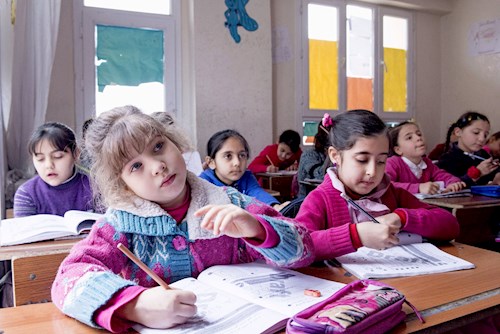Your Final 10 Nights for Gaza – Automate your charity in the blessed last 10 nights of Ramadan.
Schedule your donationsYour Final 10 Nights for Gaza – Automate your charity in the blessed last 10 nights of Ramadan.
Schedule your donationsYour Final 10 Nights for Gaza – Automate your charity in the blessed last 10 nights of Ramadan.
Schedule your donationsYour Final 10 Nights for Gaza – Automate your charity in the blessed last 10 nights of Ramadan.
Schedule your donations9th February 2018
On Sunday 11th of February, we mark the UN’s International Day of Women and Girls in Science. Around the world, too many women and girls are excluded from participating in science. In some countries, girls are denied an education altogether.
Both scientific advancement and gender equality are vital for the achievement of the internationally agreed 2030 sustainable development goals. Important steps have been taken over the past 15 years to engage women and girls in science, but unfortunately, women and girls are still excluded from full participation.
Access to education should be available to everyone, regardless of gender. However, 130 million girls around the world are out of school, and 15 million girls of primary school age will never set foot in a classroom. Girls who are uneducated are more at risk of poverty, child marriage, violence and disease, including HIV and Aids.

Child marriage is a major obstacle to female education and 15 million girls under the age of 18 will be married off every year. That’s 41,000 girls every single day. Poverty is often a driving factor in child marriage, as parents simply cannot afford to feed and clothe all of their children. Local values and cultural practices too often dictate that sons are the most important offspring, and daughters are less valuable. If there isn’t enough money at home to send both girls and boys to school, the education of boys is prioritised.
When girls are married young, they are often forced to stop their education early and start bearing children for their husband. Without control over their reproductive choices or a formal education, these girls are robbed of important options for the rest of their lives.
Gender-based violence in school is a reality for many girls. In some countries, there are issues with teachers and male pupils devaluing female students because they do not believe that girls have a place in formal education. The adequate training of teachers is important to ensure that school is an inspiring and supportive environment that challenges outdated notions of gender.
It’s essential that girls are able to access foundation skills in literacy and numeracy, and gain a sense of self-confidence and the ability to successfully communicate and negotiate. Without these core competencies, women and girls cannot enter multiple fields, including science, medicine and engineering.
In the occupied Palestinian territories, lives and livelihoods are threatened by acute poverty. Nearly a quarter of all people in Palestine can’t afford nutritious food to eat. Food insecurity is particularly high among women and 36% of female-headed households are food insecure, compared to 21% of those headed by men. This is due to a variety of factors, one of which is the lack of value placed on women receiving education and practical skills training.
In 2017, we were able to equip 7,200 female students at the Islamic University of Gaza (IUG) with brand new computers, allowing them to more efficiently learn and reach their academic potential in 2017. This project will guarantee that students for years to come benefit from the upgraded facilities provided.
At the Islamic University of Gaza and the University College of Applied Sciences, we have sponsored 167 female students so that they can complete their degrees without financial worries. These students can now focus completely on finishing their studies and entering the workforce from a position of strength. These women will be vital assets to Palestine’s severely weakened economy and with a high-quality education, they can lift themselves and their families out of poverty.
Thanks to the support of our amazing donors, we also provided stationary and other supplies to 70 schools in Syria, allowing 32,179 girls to receive high-quality, formal education. The stability of school is incredibly important for conflict-affected children, many of whom cannot remember a life in peacetime. In a country blighted by violence, a meaningful education is a powerful tool in preventing a whole cohort of Syrian children from becoming a ‘lost generation’.
Educated women have more choices. They can support their families, exercise greater control over their own lives and choose a path out of poverty.
By donating to our Education Fund, you can help more women and girls to access the essential education and training that will give them a brighter future.
Lift a little girl out of poverty today.
Donate now